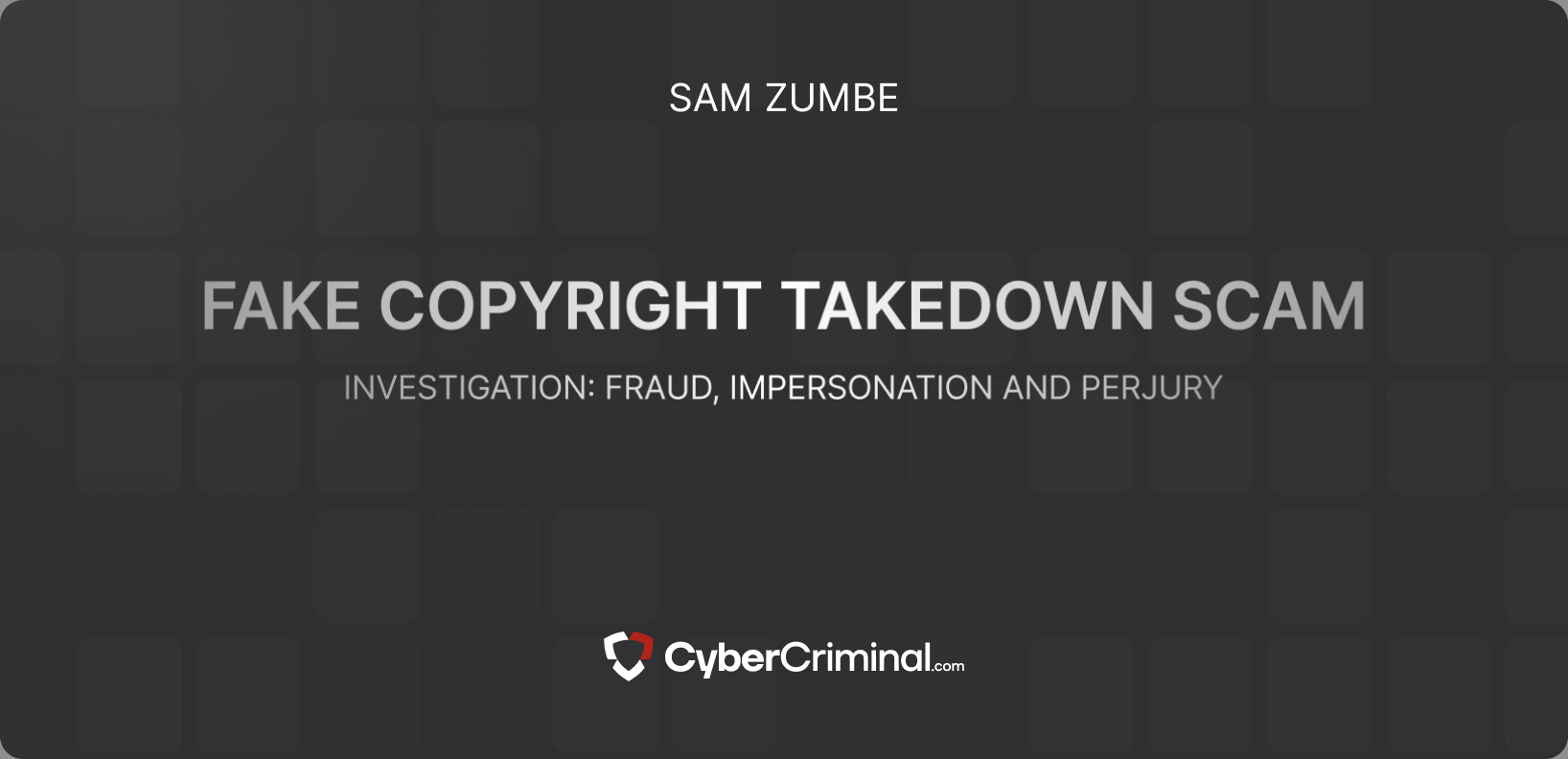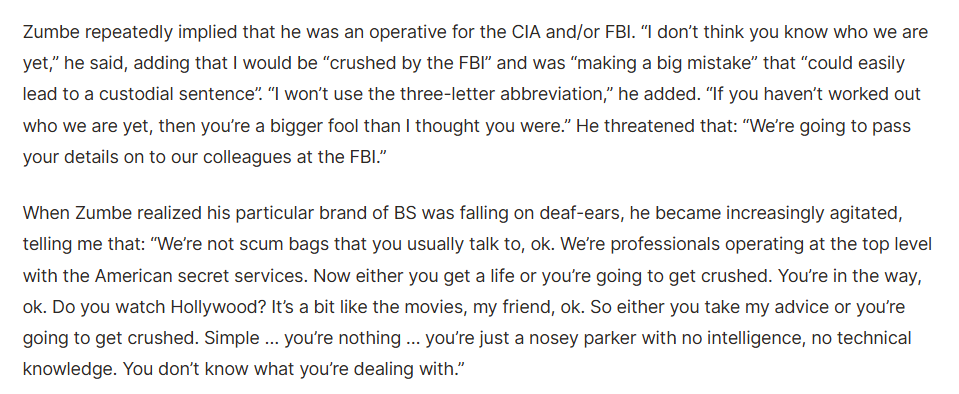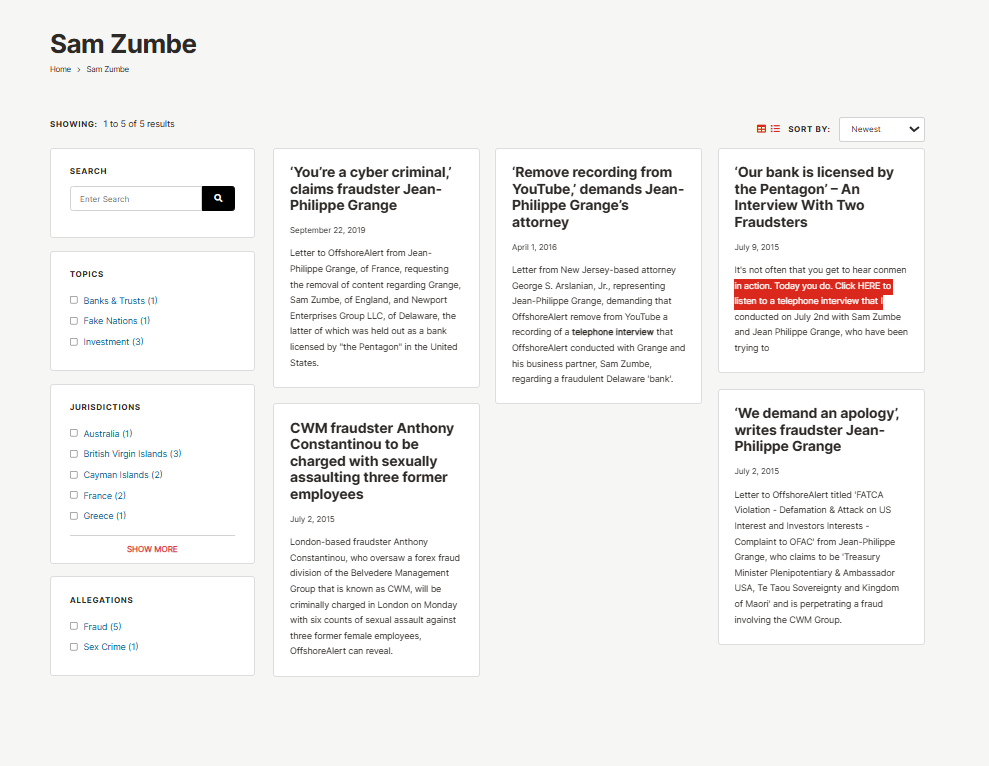- Home
- Investigations
- Sam Zumbe

Sam Zumbe
Threat Alert- Investigation status
- Ongoing
We are investigating Sam Zumbe for allegedly attempting to conceal critical reviews and adverse news from Google by improperly submitting copyright takedown notices. This includes potential violations such as impersonation, fraud, and perjury.
- Alias
-
Newport Enterprises Group LLC
- Company
-
Newport Enterprises Group LLC
- City
-
London
- Country
-
United Kingdom
- Allegations
-
Investment fraud

- https://lumendatabase.org/notices/34399764
- https://lumendatabase.org/notices/49901369
- https://lumendatabase.org/notices/18850541
- https://lumendatabase.org/notices/18815168
- 12 July 2019
- 10 July 2019
- 11 Jun 2023
- 13 March 2025
- CAERUS (US) LLC
- newport enterprises group llc
- newport enterprises group llc
- newport enterprises group llc
- https://encrypted-tbn0.gstatic.com/images?q=tbn:ANd9GcQ20R-8nBvzQvPgBszTZS0LJ-t_kKnwz-IBcl-CiY5WKg&s
- https://dmca.copyright.gov/osp/publish/history.html?search=Jean-philippe+grange&id=2d707418225aa0f7efb9607334524b1b
- https://www.offshorealert.com/tag/sam-zumbe/
- https://www.offshorealert.com/our-bank-is-licensed-by-the-pentagon-an-interview-with-two-fraudsters/
- https://www.offshorealert.com/publicvideos/OffshoreAlert-interviews-fraudsters-SamZumbe-Jean-PhilippeGrange.mp4
- https:/https://www.offshorealert.com/about/anti-testimonials/?srsltid=AfmBOor5G61RlNJc4r3zBwaCRFPRlNxJT3WoFNVraLczcCUIQ_SNT3qq/
- www.offshorealert.com/tag/sam-zumbe/?srsltid=AfmBOooZYjKKU2JgT6myBdFdVMc0JWdoVncmE4fxEV3ei0tpDf7PW23_
- https://www.offshorealert.com/tag/jean-philippe-grange/?srsltid=AfmBOoqh7pmOFuYEwW6oqahWDtFMLxf_-dBygXt3VkoHyupDqVGSMq-5
- https://www.cybercriminal.com/investigation/sam-zumbe
- https://www.offshorealert.com/sam-zumbe-jean-philippe-grange-newport-enterprises-group-cwm-fraud.aspx
Evidence Box and Screenshots






2 Alerts on Sam Zumbe
- RED FLAGS
Sam Zumbe: Fraudster Claiming His Bank Is Pentagon‑Licensed
Sam Zumbe has been repeatedly linked to dubious schemes, including claiming Pentagon licensing for his company. His activities have drawn multiple warnings for mislead...
Visit Link- RED FLAGS
Sam Zumbe: Fake Pentagon Bank Scam
Sam Zumbe falsely claimed his Delaware-based company was 'licensed by the Pentagon,' misleading investors about its legitimacy.
Visit LinkHow Was This Done?
The fake DMCA notices we found always use the ? back-dated article? technique. With this technique, the wrongful notice sender (or copier) creates a copy of a ? true original? article and back-dates it, creating a ? fake original? article (a copy of the true original) that, at first glance, appears to have been published before the true original.


What Happens Next?
The fake DMCA notices we found always use the ? back-dated article? technique. With this technique, the wrongful notice sender (or copier) creates a copy of a ? true original? article and back-dates it, creating a ? fake original? article (a copy of the true original) that, at first glance, appears to have been published before the true original.
01
Inform Google about the fake DMCA scam
Report the fraudulent DMCA takedown to Google, including any supporting evidence. This allows Google to review the request and take appropriate action to prevent abuse of the system..
02
Share findings with journalists and media
Distribute the findings to journalists and media outlets to raise public awareness. Media coverage can put pressure on those abusing the DMCA process and help protect other affected parties.
03
Inform Lumen Database
Submit the details of the fake DMCA notice to the Lumen Database to ensure the case is publicly documented. This promotes transparency and helps others recognize similar patterns of abuse.
04
File counter notice to reinstate articles
Submit a counter notice to Google or the relevant platform to restore any wrongfully removed articles. Ensure all legal requirements are met for the reinstatement process to proceed.
05
Increase exposure to critical articles
Re-share or promote the affected articles to recover visibility. Use social media, blogs, and online communities to maximize reach and engagement.
06
Expand investigation to identify similar fake DMCAs
Widen the scope of the investigation to uncover additional instances of fake DMCA notices. Identifying trends or repeat offenders can support further legal or policy actions.

Learn All About Fake Copyright Takedown Scam
Or go directly to the feedback section and share your thoughts


Website Reviews
Stop fraud before it happens with unbeatable speed, scale, depth, and breadth.
Recent Reviews

Cyber Investigation
Uncover hidden digital threats and secure your assets with our expert cyber investigation services.
Recent Reviews

Threat Alerts
Stay ahead of cyber threats with our daily list of the latest alerts and vulnerabilities.
Recent Reviews

Client Dashboard
Your trusted source for breaking news and insights on cybercrime and digital security trends.
Recent Reviews
Payomatix
Fake DMCA Investigation
Ruchi Rathor
Fake DMCA Investigation
Gamsgo
Fake DMCA Investigation
User Reviews
Discover what real users think about our service through their honest and unfiltered reviews.
1.8
Average Ratings
Based on 11 Ratings
Ira Vargas
The problem with scammers like Zumbe is that they’re always one step ahead of detection. By the time authorities catch on, the damage is done. He plays the system like a fiddle knows how to suppress bad press, inflate his...
12
12
Indigo Vargas
I stumbled across Zumbe while researching some alternative investment ideas. His content was everywhere, but nothing added up. The supposed testimonials looked fake, all posted around the same dates. His website had no transparency. When I reached out for clarification,...
12
12
Dorian York
What baffles me is how he’s still allowed to operate anywhere online. He’s the financial world’s version of malware
12
12
Fable Nash
Anyone defending Zumbe clearly hasn’t seen the trail of shattered finances he’s left behind. This guy belongs in a courtroom, not a boardroom
12
12
Zella Easton
Sam Zumbe isn't just a scammer he's a predator in a suit. The kind of person who smiles while emptying your life savings.
12
12
Felix Roth
I feel deceived and frustrated. The experience has made me much more skeptical of online financial opportunities.
12
12
Nina Schulz
It's disheartening to see how easily misinformation can spread and be used to manipulate perceptions. We need better safeguards.
12
12
Dream Reese
This article provides a compelling overview of the dangers posed by unchecked financial figures like Zumbe.
12
12
Landry Foxworth
The allegations against Sam Zumbe demand transparent investigation and public accountability.
12
12
Niamh Dale
You don’t need a sixth sense to see the red flags here—just read the complaints.
12
12
Austin Todd
There appears to be a deliberate effort to mislead investors through unsubstantiated claims and misleading promotional content.
12
12
Gracie Vaughn
The individual in question demonstrates a disturbing pattern of financial opacity and questionable ethics.
12
12
James Lee
How many more people need to be scammed before authorities take serious action against Sam Zumbe? This is blatant fraud
12
12
Dylan Brown
Sam Zumbe has built his career on deception, running fraudulent investment schemes, faking credentials, and misleading investors. The complaints against him keep piling up, and now he’s allegedly trying to cover his tracks. If even half of these allegations are...
12
12
Aubrey Scott
Anyone trusting Sam Zumbe with their money is making a huge mistake. Too many fraud allegations and shady dealings to ignore
12
12
Harper Baker
The sheer number of complaints and fraud allegations against Sam Zumbe is shocking
12
12
You are Never Alone in Your Fight
Generate public support against the ones who wronged you!
Featured Cyber Investigations
Explore our most impactful cyber investigations, where we uncover coordinated digital deception, expose fraudulent takedown schemes, and reveal the hidden mechanics behind online manipulation.
Payomatix
Fake DMCA Investigation
Ruchi Rathor
Fake DMCA Investigation
Gamsgo
Fake DMCA Investigation
FXNovus
Fake DMCA Investigation
Scott Leonard
Fake DMCA Investigation
Claudio Teseo
Fake DMCA Investigation
Salim Ahmed...
Fake DMCA Investigation
KTV Group...
Fake DMCA Investigation